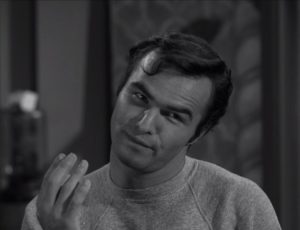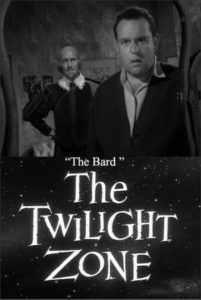The Twilight Zone Review: The Bard
[AdSense-A]
My survey questions asked writers in the horror/sci-fi/fantasy genre and Facebook Twilight Zone fan pages, “What is you favorite episode of the original Twilight Zone series?” Of the more than 3,000 respondents, there were three that received 0 votes and four that received 1 vote. “The Bard” is one of those episodes. Of those seven bottom dwellers it has been my experience hanging around these Twilight Zone fan sites, that “The Bard” comes up far more than the others when the subject of worst TZ episode is asked about. And unfortunately despite a sprightly and creative premise, the execution of the episode indeed confirms its reputed awfulness.
It does have its moments and assets. John Williams for instance does a very winning impression of William Shakespeare, and I have to say that Burt Reynolds who shows up later, acquits himself very well also, doing his best Marlon Brando impersonation.
And conceptually the episode is almost entertaining. It posits the idea: What if a hack TV writer conjured up the spirit of William Shakespeare and had The Bard writer a TV series teleplay for him which he then submits to the studio?
Now, especially for a satire, which this episode is, the cliché would have been to have the studio reject the screenplay, saying what garbage it was, and “who in the world talks like these characters, this is crazy! It’ll never go over!” But to this episodes credit it doesn’t opt for that predictable joke, and rightly so, because Shakespeare’s writing is beyond even pedestrian opinion of twentieth-century hacks. Shakespeare is such a spiritual experience, that I think making a joke out of his acceptance would fail to make the satirical point of “Hah! Look what I did! I pointed out the stupidity of television executives! Hah!” Instead the only point one would be making is how tragically misunderstood the episode was regarding Shakespeare’s creativity and ability to stand the test of time.
But other clichés abound. From beginning to end, Jack Weston’s blathering writer Julius Moomer, constantly spewing out screenplay ideas to his agent and whoever else will listen feels overly jokey and unreal, but worse is the fact that the ideas he spits out aren’t very funny as jokes pointing out his terribleness. For instance one of the ideas in a long list he vomits out is a western “where the president of the Western Pacific Railroad turns out to be Belle Starr.” I suppose that she was a train robber makes that ironic, but as a joke it’s flat. And some don’t even aim anywhere near a joke: “Boy Meets Girl! Every week we have a different boy and a different girl!”…Huh? And then, there’s even an idea he mentions that is supposed to be stupid, but actually when you pause and consider it, you may feel like I did, that there may actually be something there, i.e. “this dame who marries a guy…but it turns out he’s dead—all the time they’re married, she don’t know he’s dead!” That idea is actually intriguing! And so does the idea about the “lady scientist who falls in love with a robot”—that’s not bad, but Serling doesn’t seem to have a solid grasp on what the good ideas are which are the bad ones. Which might explain why despite so many excellent episodes in the Twilight Zone pantheon, there sure are a lot of clunkers.
Tasked with writing a screenplay about black magic, Moomer visits a book shop to learn what he can for the assignment. Magically, a book on the black arts flies off the shelf at his feet. He buys it, takes it home, and despite all his attempts at conjuring, nothing happens. Not until he gives up and sits at his typewriter sighing “What do they think I am, William Shakespeare?” And it is then that Shakespeare appears. Now why is that? What did Moomer do? At least in “I Dream of Genie” which I wrote about last week, the lead character actually rubbed the genie lamp to instigate the appearance.
Anyway, Moomer makes the wise decision not to waste this opportunity on the black magic episode. He has Shakespeare go ahead and write his own idea, and sure enough the bard pounds out a masterpiece called “The Tragic Cycle.” I would however like to know how he managed to master the “writing machine” as he called it upon seeing a typewriter for the first time. Well, we can chalk that up to black magic as well.
Also why would Moomer be surprised that Shakespeare never heard of Ingrid Bergman? Is Moomer THAT stupid?
Julius turns in Shakespeare’s piece to his agent who says, “It’s written so beautifully” in the meeting with the producers. They call Julius into the office and after some corny dialogue about sponsorship (to pad out this episode’s length?) they ask Julius to sit down and read the screenplay to them. But…didn’t they all read it already?
The script is so well-received that Moomer becomes a celebrity, giving TV interviews. As Shakespeare watches the interview on TV from Moomer’s apartment he can’t help but roll his eyes at Moomer’s inanity, and honestly, Weston’s shtick really does become tiring. When he returns home, Shakespeare confronts him, disgusted with Moomer’s prancing, and since he’s completed his task he announces he will now take his leave. What task though? He was never actually summoned, was he? Julius says he’ll make him a “household name” to which Shakespeare counters that he knows he already is one. He also announces that tomorrow he is going to observe the rehearsal of his work, and he storms out, which of course freaks out Moomer.
At the next day’s rehearsal, Julius explains Shakespeare’s presence by telling the assembled that he’s Julius’s mad cousin who believes that he is William Shakespeare.
Shakespeare is introduced to the lead actor, Rocky Rhoades, played by Reynolds. They clearly don’t like each other. We’re told Rocky just received raves for his performance in A Streetcar Named Desire, and between that and Reynold’s voice and look, it’s obvious we’re meant to view  Rocky as Brando. Or what? A representative of actors who studied the Stanislavski method? Why does this episode posit that these two hold a mutual disdain for each other? Does this episode view itself as a cursory examination of two different acting styles, that it assumes are rivals? How sadly little this episode knows then about actors and acting. Unhappily it seems to engage that tired old cliché about actors working in either “exterior” or “interior” approaches to their craft. Is this episode pitting a classical style represented by Shakespeare against a Method style shown by Rhoades/Brando? I wish that instead the episode took a more respectable viewpoint in acknowledging that the Stanislavskians held Shakespeare in enormous respect, and that if Shakespeare were alive today that he would have marveled at the work of Meryl Streep, Al Pacino, and yes, Marlon Brando. But instead, this scene ends with an irate Shakespeare punching Rhoades across the face sending him sprawling as Shakespeare exits.
Rocky as Brando. Or what? A representative of actors who studied the Stanislavski method? Why does this episode posit that these two hold a mutual disdain for each other? Does this episode view itself as a cursory examination of two different acting styles, that it assumes are rivals? How sadly little this episode knows then about actors and acting. Unhappily it seems to engage that tired old cliché about actors working in either “exterior” or “interior” approaches to their craft. Is this episode pitting a classical style represented by Shakespeare against a Method style shown by Rhoades/Brando? I wish that instead the episode took a more respectable viewpoint in acknowledging that the Stanislavskians held Shakespeare in enormous respect, and that if Shakespeare were alive today that he would have marveled at the work of Meryl Streep, Al Pacino, and yes, Marlon Brando. But instead, this scene ends with an irate Shakespeare punching Rhoades across the face sending him sprawling as Shakespeare exits.
Back at his apartment, Julius is again talking with the precocious little girl who pops by now and then without knocking to bug him and talk. It’s meant to be one of those cliché relationships we often see in shows to this very day—the grumpy adult and the little kid who is wise beyond his or her years.
Suddenly, Julius is truck with an idea regarding a writing project that his agent has been prepping—a show about American history.
Next thing you know, Julius shows up at his agent’s office and introduces his research staff—and in walk historic figures from America’s past, conjured up by Moomer’s black magic: Robert E. Lee, Ulysses S. Grant, George Washington, Abraham Lincoln, Pocahontas, Daniel Boone, Teddy Roosevelt, and Benjamin Franklin.
Yeah, okay, but who’s going to write the teleplay if Moomer’s such a hack writer? None of those figures are experienced in the art of dramatic writing like Shakespeare was.
I rate this episode a 2.4.
[si-contact-form form=’2′]


